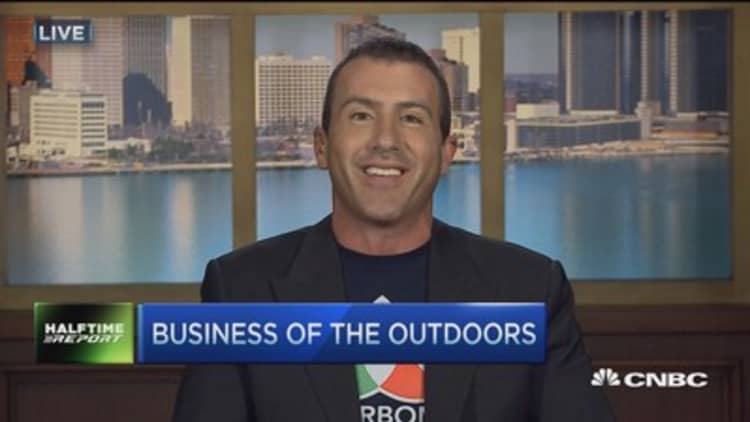A man shot a lion in Africa, and the Internet exploded.
A male African lion was shot by an American hunter near the border of a national park in Zimbabwe where the lion lived with several lionesses and cubs, and the death has reignited a debate about whether the hunting of big game animals—particularly those that may be threatened or endangered—helps fund conservation efforts that would otherwise lack support.
The lion, named "Cecil" by locals, was a favorite attraction for tourists visiting the park. He reportedly was shot by a dentist from Minnesota named Walter Palmer, an avid big game hunter who is believed to have paid around $50,000 to kill the animal, according to reports from the Associated Press.
Read MoreLion killer has prior felony record
The hunt may have been illegal. The Zimbabwean government has arrested both the professional guide and the owner of the land where the hunt took place, said Johnny Rodrigues, executive chairman of the Zimbabwe Conservation Task Force, a conservation group based in Zimbabwe.
Local hunter Theo Bronchorst and game park owner Honest Trymore Ndlovu, who allegedly "connived" to kill Cecil the lion, appeared court in Hwange on Wednesday. They did not speak to reporters.
Killing lions and other big game is sometimes legal, if permits are obtained and rules are followed. Palmer told the Minneapolis Star Tribune that he believed the hunt was legal, but some activists, including Rodrigues, question that assertion.

Conservation groups are divided about whether trophy hunting is a ultimately beneficial to wild populations of animals. Many say that if it's managed properly, it can aid conservation by providing needed revenue for fighting poaching and helping other efforts.
A 2009 report from the International Union for the Conservation of Nature said that regulated hunting can help conservation efforts, but that its record has produced "mixed results."
Jeff Flocken, North American director for the International Fund for Animal Welfare, said most people are unaware that lions and other big game animals are regularly killed for sport.
Read MoreFighting the $3 billion illegal ivory trade with DNA
"The real question here is, 'Why are we allowing these imperiled species to be killed for fun?'" Flocken said. "Lions, elephants and rhinos are being killed for sport, often by Americans."
Flocken said that polls show that 80 percent of Americans across party lines are against the hunting of endangered animals for sport. His group is one of several that have pushed the U.S. Fish and Wildlife Service to place lions on the endangered species list.
Those efforts have been unsuccessful so far. While the Endangered Species Act is unenforceable outside the United States, it does ban the transport of endangered animal products—including trophies—into the U.S.
A spokesman for the U.S. Fish and Wildlife Service said the agency is "deeply concerned" about the killing of the lion Cecil and is gathering facts about the case.
"In 2014, the service proposed listing the lion as threatened under the Endangered Species Act with a special rule that would establish a permitting mechanism for the importation of sport-hunted lion trophies, provided that the lions originate from countries with a scientifically sound management plan for African lions," the service said in a statement. "The public comment period for that proposal closed in late January, and we are currently working on preparing a final rule. That process generally takes a year."
A staffer for an international hunting and conservation association called the Safari Club International Foundation wrote an editorial in National Geographic in 2013 contending that hunting funnels money toward conservation. In theory, the fees paid by hunters like Palmer go toward saving species.
The editorial also said that scientific evidence does not support the notion that lions are endangered, though their numbers in the wild have almost halved in the last two decades. The U.S. Fish and Wildlife Service says the biggest threats to lions are habitat loss, loss of available prey and retaliation from humans for killing livestock.
Flocken is skeptical of trophy hunters' arguments, saying that "studies have found that as little at 3-5 percent of that money actually gets to people on the ground."
He also said that attempts to compare hunting with "nonlethal" tourism, such as wildlife watching, places "the revenue from hunting in Africa in the millions, and revenue from nonlethal tourism in the billions."


